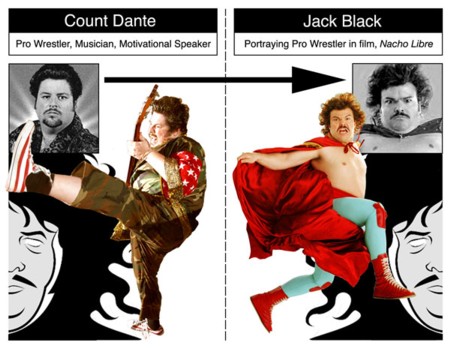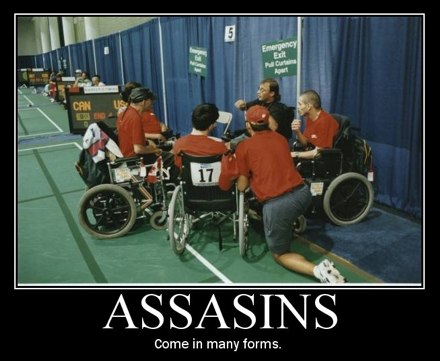
I'm not even going to try and put a quick label on Rondo. He simply defies them, whether positive or negative. As much as any player in the NBA, Rondo is paradox incarnate. Rather than being a paradigm of quiet contribution and efficiency at all times—the standard "know your role" PG—Rondo is at once an unstoppable for whom there is no possible answer and a gaping wound whose weakness provides a possible attack point. He is the type of young, talented, and developing player who normally thrive on bad teams, but he runs the point for the league's current juggernaut. He the worst shooting guard in the NBA, and yet leads all guards in FG%. He's brimming with athletic skill and his body looks like the product of Jay Bilas being allowed access to the Forge of Hephaestus, and yet he's more beloved by stat heads than scouts. His play is more audacious than any guard in the league, and yet he is the unknown star of the Celtics.
The fantastic of Rondo all traces back to the fact that he has no jump shot. This is hardly news. However, it is important to make some distinctions between having a bad jump shot and Rondo's jump shot. Russell Westbrook and Raymond Felton have bad jump shots. They are given space and it is the goal of every defense to force them into taking a shot, and it is a constant struggle for them to create lanes by trying to keep defenses honest. Rondo has no jump shot. He has eschewed it. It is a false God to him. It is not a part of his decision tree but an unwelcome last resort. Defenses do not try to force him to take a jump shot, for there is no pretense he will actually take one. When Rondo gets the ball in his hands, the clarity of his goal actually leads to a greater set of permutations than it normally would-if we are to stretch the metaphor of the outside shots, than the difference between other point guards' possessions and Rondo's possessions are the difference between a gunfight and swordplay.
![Mattleither-RollOversSeatbeltsLiveOrDie377.flv[1]](http://farm4.static.flickr.com/3016/2628304350_a2a668554c_o.jpg) <
<To wish, as most do, for a Rondo with a jumpshot is to wish for a sober Bukowski, a Woody Allen with normal relationships, Obama without the Bush era. Part of what makes him so much better this year, and most of what makes the Celtics tolerable now, is Rondo's embracing of his own destiny and his mandate to all others to get on board. Rondo this year has matured by regressing to his orginal state and taking it to its logical conclusion, rather than attempting to straddle compromise. Whereas last year, he flirted with the idea of playing like a conventional point guard and even started to become passable at it-last year 56% of his shots were jumpers and he shot a very acceptable 42% on them, which is far from terrible. All his shots were wide-open, yes, but that is a better mark than LeBron James has ever posted. This year, however, he has decided to completely reject any semblance of obeying a positional doctrine and has seen his jump shot FG% fall to 33% and, more importantly, has upped his percentage of "inside" shots to 58%, which is a full 10% higher than the next guard and higher than, for example, Pau Gasol and Amare Stoudemire.
At the same time, while Rondo would occasionally sit in the corner and take a passive offensive role last season and allow Paul Pierce and Kevin Garnett to make the plays, this year he demands that the veterans fall into line and allow him to be the one who creates. And Rondo is perhaps the purest creator in the NBA. I've long maintained that point guards are like writers, whose effectiveness is determined not by their own personal ability to put the ball in the basket but to turn the court into their own dark funhouse and make the opposing team see the game on the point guard's revised and ultimately manipulative terms. Steve Nash's world is one of impossible choices-he is the best-shooting guard in the league, and he forces defenders to attempt to consolidate their force into a stationary Maginot line that he can fit the ball around. Chris Paul's is one of forced annexation-he is everywhere on the court he wants to be, invading spaces (against the Lakers, there was one possession where he got a basket by going to the basket by dribbling in step behind Lamar Odom's turned back) and blowing up rotations into a chaos only he can see angles through. Rondo's game is predicated, more than anything else, on his ability to become a creature of nightmares. While Paul is a wily trickster who flits around defenders and coerces them out of their comfort zones, Rondo uses his athleticism to fool defenders into seeing things as simpler than they really are. For Rondo to succeed without having any sort of personal go-to scoring moves, he must make himself capable of all things.

The most important of Rondo's myriad dichotomies is his relationship to the rebulous concept of completionism. Clearly, Rondo is an incomplete player on an individual level. However, on a team level, he completes his team in a way Battier could only dream of doing for his own. Rondo's lack of individual manuevers means that all of his actions are aimed at either getting to the basket or creating a wide-open shot for somebody else; his lack of completion makes him exist less as a player and rather as a concept of absolute efficiency-that he has no step-back jumper as his Plan B just means the game to him is an infinite number of paths to Plan A. Not only does Rondo thrive on the Celtics, but he could only exist on the Celtics-without options around him, his freedom would be channeled unto himself instead of serving to transform him into a manifestation of Occam's Katana Blade. And it should be noted that the receiving end of Rondo's creation is often a simple 18-foot jumper by Kevin Garnett, who, many years ago would once position himself as the roll man and look to spin and finish in a spectacular and wholly improvised fashion before he became Complete and relegated himself to an upgraded Antonio McDyess.
Mo Williams, who I'm realizing I find far less interesting than Rondo, nonetheless provides the counterpoint to how individual completionism can have team-level benefits. Mo utilizes a sort of hybridization of the short-lived Iversonian school of scoring, which is to block out the court and turn the game into a battle against one defender for the best immediately possible shot opportunity and the new efficiency-dictated model for scoring, which is to find a way to get the ball to the most high-percentage shots on the floor and to value quality possessions over shot creation.
Mo functions well as a finisher of created plays, but with the ball in his hands Mo has a few spots on the floor that he uses a screen to get to and can always get off a decent-percentage shot from. This shows in Mo's stat line-with radically different teammates around him, his PER is exactly the same as it was last year, and his shot breakdown remains nearly identical. Mo doesn't change dynamics of a given play the way Rondo does, but his abilities as an Island Unto Self provide a foundation atop which ball movement and the general Amazing made by LeBron can then be placed with Mo functioning as a safety net.
And so there it is-Mo succeeds with fundamentals, Rondo with spectacularly flawed gifts. To say that a combination of them would be the perfect guard is to miss the point of them entirely.















No comments:
Post a Comment